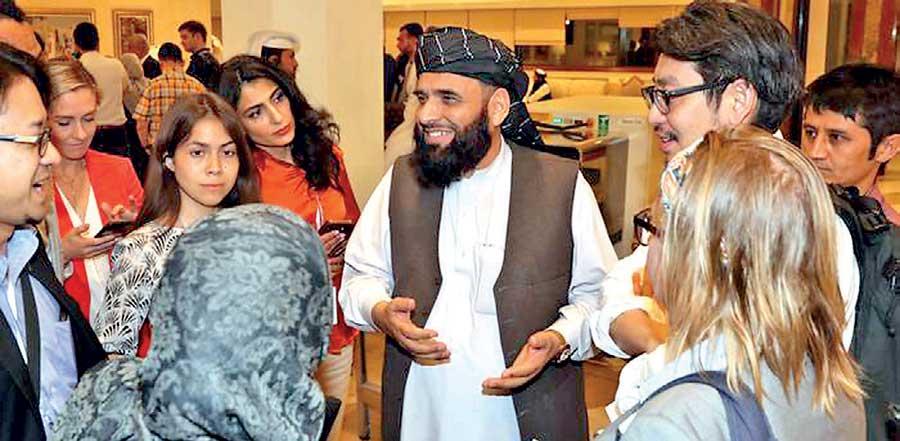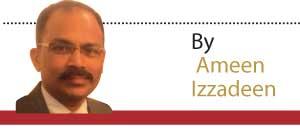The Taliban and the UN’s democracy dilemma

Suhail Shaheen, Taliban’s ambassador-designate for the UN, addresses journalists in Doha.
1 October 2021
The United Nations is often derided as a talk shop. Once a year, the Glass House by the East River offers a stage for world leaders to strut about and talk about their achievements and vision for the world. The atmosphere resembles a school speech contest. The stage is a great leveller that does not discriminate on the basis of whether the one who takes to the podium is a democratically elected leader, a revolutionary, a dictator, a despot or a coup leader. 
Simply put, democracy counts little in the UN’s preparation of the speakers’ list. The process is more or less in built. As long as a country is recognized as a member, its leader can attend the annual General Assembly sessions, whether the host nation, the United States, recognizes the country concerned or not. If there is a change of government or if two rival governments stake competing claims for UN recognition, the matter is sorted out by the United Nations’ nine-member Credentials Committee, whose members include the US, China and Russia, and the 193-member General Assembly.
After the Taliban which in August captured power through an armed insurrection against the US-led occupation force and a puppet government the occupiers had installed, the Islamic Emirates of Afghanistan (IEA) is staking a claim for Afghanistan’s UN seat, although it is well known that the new Taliban rulers have dismissed democracy as ‘un-Islamic’ in keeping with their understanding of Islam.
Last week, the Taliban regime’s Foreign Minister Amir Khan Muttaqi informed the UN that the Taliban’s Doha-based spokesman Suhail Shaheen had been appointed as the country’s new UN ambassador and demanded that he be given the opportunity to address the annual sessions.
With politics overriding concerns for democracy at the world body, the Taliban regime is eventually likely to win UN recognition, although the ousted government’s representative claims that he represents Afghanistan and insisted that he should address the UNGA sessions. However, on Monday, the last day of the UNGA sessions, he withdrew his name. He will remain Afghanistan’s representative until the credentials committee takes a decision, perhaps at the end of this year. It is likely the Taliban regime will be given the UN seat, because a decision to give the seat to a non-existent Afghan government of ousted President Ashraf Ghani entails practical problems. The lobbying in favour of the Taliban is intense with several countries expressing the view that recognition could make the Taliban less ruthless and make them listen to the world opinion.
When the Taliban ruled Afghanistan from 1996 to 2001, the credentials committee kept postponing the decision as to which government should represent Afghanistan – the Taliban or the Mujahideen government of President Burhanuddin Rabbani.
A similar crisis rose with regard to Myanmar during this year’s UNGA sessions. However, Myanmar’s junta and the government it ousted reached an understanding and decided not to speak at the annual sessions.
The UN’s former Secretary General Kofi Annan once famously said countries where dictators come to power through military coups should be denied their UN memberships. But there has been little follow up action in this direction. The Commonwealth suspends member-states when a military coup takes place or democracy is in a serious crisis in a member state.
In any case, the UN’s democratic credentials are mired in controversy with the composition of the UN Security Council, the decision-making body, itself is seen as a dictatorship of the five permanent members who are armed with veto powers. Often the veto power is misused as has been the case with the US which uses its veto to defend Israel’s atrocities against freedom-seeking Palestinian people.
The term democracy does not even appear in the UN Charter. However, the UN says that although the founders who drafted the Charter did not mention the word democracy, the opening words of the Charter, “We the Peoples”, reflect the fundamental principle of democracy - that the will of the people is the source of legitimacy of sovereign states and, therefore, of the UN as a whole.
“The UN does not advocate for a specific model of government but promotes democratic governance as a set of values and principles that should be followed for greater participation, equality, security and human development,” says a UN statement on democracy.
Moreover, the Universal Declaration of Human Rights (UDHR) -- adopted by the UNGA in 1948 -- in Article 21 outlines some of the fundamental principles of democracy: the will of the people should be the basis of government authority, and everyone has the right to take part in the government “directly or through freely chosen representatives.” It calls for periodic, genuine elections with universal suffrage and secret ballot.”
But being a UN member does not mean a member-state automatically becomes a party to all the UN conventions. However, with regard to the UDHR, the dominant legal opinion is that it is a fundamental constitutive document of the UN and, by extension, all 193 member-states are parties to it. Yet, some member-states have no qualms over ignoring many a provision of the declaration, especially Article 21, as the UN has no mechanism to strip a nation of its UN membership if the rules are observed in the breach.
Therefore, the Taliban regime is unlikely to adjust itself in keeping with the UDHR’s Article 21 and adopt democracy although it is serious about winning the UN seat.
Quite a few nations which are UN members are not democratic, and, to boot, big time human rights violators. For instance, Israel is a notorious oppressor of human rights, yet it is recognized as a respected member of the community of civilized nations. Another example is that countries like Saudi Arabia and the United Arab Emirates consider democracy as irrelevant for governance. As the 17th century British satirical poet, Alexander Pope, had said, these countries seem to believe that a system which is best administered is best for the people. It need not be democracy.
Despite the dislike for democracy, these wealthy nations count among their allies the US and other big western powers, which portray themselves as champions of democracy. But in fact, the western powers’ democracy promotion is selective and often targeted at aid-dependent countries where they have little vested interest. Therefore, a nation’s democratic credentials do not often stand in the way of a country’s recognition in the world body.
But the Taliban is now ruling over a country that has plenty of resources waiting to be exploited. The world powers eyeing a share in the pie, and those who seek a foothold in the geo-strategically important nation are unlikely to bring democracy as a condition to recognize the Taliban regime when the matter comes up before the credentials committee.
UN Secretary-General Antonio Guterres says the Taliban’s desire for international recognition will be the only leverage other countries have to press for inclusive government and respect for rights, particularly for women, in Afghanistan. He appears to be unrealistically optimistic.

No comments:
Post a Comment
Note: only a member of this blog may post a comment.